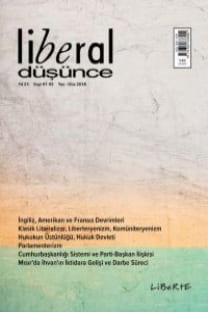Çin’in Ortadoğu Politikası: Süreklilik ve Değişim
Çin, Ortadoğu, dış politika, enerji, yükselen güç, işbirliği
Middle Eastern Policy of China: Continuity and Change
China, Middle East, Foreign Policy, Rising Power, Energy, Cooperation,
___
- An, Jiang (2013), Mao Zedong’s “Three Worlds” Theory: Political Considerations and Value for the Times, Social Sciences in China, ss. 35-57.
- Calabrese, John (2019), "China and Syria: In War and Reconstruction", Middle East Instiute, 9 June 2019, https://www.mei.edu/publications/china-and-syria-war-and-reconstruction (E.T: 21 Ocak 2020).
- China’s Arab Policy Paper (2016), Beijing, China. http://english.www.gov.cn/archive/publications/2016/01/13/content_281475271412746.htm (E.T: 15 Aralık2019).
- Daher, Massoud (2009), "China and the Middle East: Establishing a New", Journal of Middle Eastern and Islamic Studies (in Asia), 3(1), ss. 18-36. https://doi.org/10.1080/19370679.2009.12023120 (E.T: 10 Aralık 2019).
- Foreign Minister Wang Yi's Comments on President Xi Jinping's Visits to Saudi Arabia, Egypt, Iran and Headquarters of League of Arab States (2016, Ocak 24), Embassy of the People's Republic of China in the Kingdom of Saudi Arabia: http://sa.china-embassy.org/eng/zt/2/t1335497.htm (E.T: 12 Aralık2019).
- Foreign Ministry Spokesperson Hua Chunying's Regular Press Conference on January 20, 2017 (2017, Ocak 20), Ministry of Foreign Affairs of the People's Republic of China: https://www.fmprc.gov.cn/mfa_eng/xwfw_665399/s2510_665401/t1432311.shtml (E.T: 10 Aralık2019).
- Full Text of Xi Jinping keynote speech at the United Nations Office in Geneva (2017, Ocak 18), CGTN America: https://america.cgtn.com/2017/01/18/full-text-of-xi-jinping-keynote-speech-at-the-united-nations-office-in-geneva (E.T: 15 Aralık2019).
- Mao, Yufeng (2005), "Beijing’s Two-Pronged Iraq Policy", China Brief, The Jamestown Foundation: https://jamestown.org/program/beijings-two-pronged-iraq-policy/ (E.T: 16 Aralık2019).
- Neill, Alexander (2014), "China and the Middle East", Adelphi Papers, ss. 205-224.
- Olimat, Muhamad S. (2014), China and the Middle East Since the World War II, Maryland: Lexington Books.
- Oosterveld, Willem (2017, Ağustos 25), "China in the Middle East: Testing the Waters, Linking the Lands", The Diplomat: https://thediplomat.com/2017/08/china-in-the-middle-east-testing-the-waters-linking-the-lands/ (E.T: 13 Aralık2019).
- Öztürk, Selim (2018), "İran’da Silahlı Muhalefetten Demokrasi Söylemlerine:Halkın Mücahitleri Örgütü", Güvenlik Çalışmaları Dergisi, s. 2, Ankara, ss. 165-175.
- Pan, Guang (1997), "China's Success in the Middle East", Middle East Quarterly, ss. 35-40. https://dev.meforum.org/373/chinas-success-in-the-middle-east
- Tınas, Murat (2019), "Suriye'de Devlet ve 2011 Sonrası Otoriterliğin Direnci", Murat Tınas ve Buğra Sarı (ed.), Doğu Akdeniz'den Basra'ya Krizler ve Düzen, Ankara: Polis Akademisi Yayınları, ss. 137-148.
- Qi, Ren (2019, Ağustos 20), "Chinese special envoy: Political solution only way ahead for Syria", China Daily : https://global.chinadaily.com.cn/a/201912/23/WS5e0018a4a310cf3e3557fe63.html (E.T: 13 Aralık2019).
- Qian, Xuewen (2010), "China’s Energy Cooperation with Middle East Oil-producing Countries", Journal of Middle Eastern and Islamic Studies (in Asia), ss. 65-80.
- Qian, Xuming ve Fulton, Jonathan (2017), "China-Gulf Economic Relationship under the “Belt and Road” Initiative", Asian Journal of Middle Eastern and Islamic Studies, ss. 12-21.
- Saidi, Nasser (2018, Nisan 12), "China’s Belt & Road: new avenues for Middle East growth and economic diversification", The National: https://www.thenational.ae/business/economy/china-s-belt-road-new-avenues-for-middleeast-growth-and-economic-diversification-1.720919 (E.T: 14 Aralık2019).
- Shichor, Yitzhak (1979), The Middle East in China's Foreign Policy: 1949-1977, London: Cambridge University Press.
- Shichor, Yitzhak (2006), "Competence and Incompetence: The Political Economy of China's Relations with The Middle East", Asian Perspective, ss. 39-67.
- Takahashi, Nobuo (1990), "The Chinese Communists and the Theory of Intermediate Zone during the 1950s", Japan Association of International Relations, ss. 63-78. https://www.jstage.jst.go.jp/article/kokusaiseiji1957/1990/95/1990_95_63/_article (E.T: 5 Aralık2019).
- Wang Yi Proposes Five Principles to Facilitate a Political Settlement of Syrian Issue (2014, Ocak 20), The Ministry of Foreign Affairs of the People's Republic of China: https://www.fmprc.gov.cn/mfa_eng/wjb_663304/zzjg_663340/xybfs_663590/xwlb_663592/t1124573.shtml (E.T: 12 Aralık2019).
- Wang, Jinglie (2010), "Review and Thoughts over the Relationship between China and the Middle East", Journal of Middle Eastern and Islamic Studies (in Asia), ss. 16-39.
- WFP, China conclude food aid programme for Syrian refugees (2018, Mart 14), The Jordan Times : http://www.jordantimes.com/news/local/wfp-china-conclude-food-aid-programme-syrian-refugees (E.T: 12 Aralık2019).
- Zhou, Enlai (1955, April 19), Main Speech by Premier Zhou Enlai, Head of the Delegation of the People's Republic of China, Distributed at the Plenary Session of the Asian-African Conference. Digital Archive Wilson Center: https://digitalarchive.wilsoncenter.org/document/121623.pdf?v=e1cd06384e2e67bdff11f809ead78849 (E.T: 11 Aralık2019).
- Zhou, Enlai (1953, Aralık 31), The Five Principles. Zhou Enlai Peace Institute: http://www.zhouenlaipeaceinstitute.org/five-principles-of-peace-2/history/ (E.T: 11 Aralık2019).
- Zhu, Zhiqun (2009), "China’s New Diplomacy in the Middle East and Its Implication for the United States", Journal of Middle Eastern and Islamic Studies (in Asia), ss. 41-52.
- ISSN: 1300-8781
- Başlangıç: 1996
- Yayıncı: Liberte Yayınları
Devlet İnşası: Yirmi Birinci Yüzyılda Yönetişim ve Dünya Düzeni
Sahra Arap Demokratik Cumhuriyeti’nin Diplomatik Ontolojisi
Seçkinci Siyaset Bağlamında Bir 28 Şubat Analizi
Mahmut Hakkı AKIN, Gökhan BOZBAŞ
Ortadoğu’yu Terörize Eden PYD/PKK’nın Seçilmiş AB Ülkelerindeki Finansman Kaynakları
Mehmet Levent YILMAZ, Ümit TETİK
Sivil Toplum, Yönetişim ve Kalkınma
Suriye İç Savaşı’ndaki Yabancı (Terörist) Savaşçılara Genişletilmiş Bakış
Filistin Direnişinin İslami Kanadı HAMAS: Kökenleri, Karakteri ve Siyaseti
Post Truth’u Hannah Arendt ile Okumak
